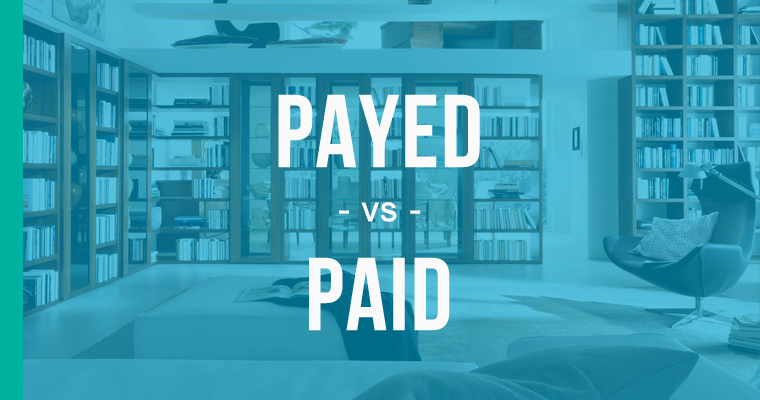Payed or Paid – How to Use Each Correctly

What’s the Difference Between Payed and Paid?
Contents
Both of these are legitimate words, but you are only likely to ever encounter one in everyday writing.
Payed is a common misspelling of the past tense form of the verb pay, but it does have its own specific definition (see below)
- Stop! That thief hasn’t payed for that food! (incorrect spelling – use paid instead)
Paid is the past tense form, and the past participle, of the verb pay. It means to give money in exchange for a good or service.
- Don’t worry. You don’t owe any money. You already paid in full.
Let’s practice a few ways you can use paid in your sentences to help you avoid making the error of using payed.
Using Payed in a Sentence
When to use payed: When used as the past tense of pay, payed is a spelling error.
For example,
- I refuse to pay for this hotel room a second time when I already payed online. (incorrect spelling – use paid instead)
- I payed my rent on time every month last year. (incorrect spelling – use paid instead)
Payed can be a correct spelling, but only in two very narrow definitions. The first definition is to give slack to a rope, in the simple past tense form payed out. The second definition has a nautical origin. It is to cover with tar in the simple past and past participle forms.
As you might imagine, these two meanings are so rare that you will likely never, or almost never, see or use them.
Using Paid in a Sentence
When to use paid: Paid is the simple past tense and past participle form of the verb pay. It means to exchange money for a good or service.
For example:
- All students who haven’t paid are subject to expulsion.
- He paid the fine in order to avoid jail time.
There are many idioms and expressions that use the verb pay. A few of those expressions are included below:
- to pay a king’s ransom: to pay a very large sum of money
- He paid a king’s ransom for his mansion on the oceanfront.
- to pay one’s dues: to work hard to achieve success
- People think the pop singer achieved fame due to her famous parents, but she paid her dues.
- to pay one’s last respects: to attend the funeral of one who has died
- I paid my last respects to my deceased cousin last week.
- to pay an arm and a leg: to pay a lot of money
- She paid an arm and a leg for an original, signed copy of her favorite novel.
- to pay a compliment: to praise someone
- He paid me a compliment the other day, so I think he might finally have stopped hating me.
- to pay attention (paid attention): give someone or something your attention
- If you want to succeed, you need to pay attention in class.
These expressions show that pay can refer to more than just money. Also, when using any of these expressions in the past tense, you will use paid, not payed.
Remembering Payed vs. Paid
One way to help you remember which is the correct past tense form of pay is to think of the verb say.
Say is a common irregular verb in English, and it is conjugated in a similar way to pay.
Say and pay both end in ay in their base form. Also, they both end in aid in their past tense form and past participle form, said and paid.
It may help to remember the sentence People always say they’ll pay, but those who’ve said they’ve paid sometimes have lied.
Outside Examples
- The last Chicago cop facing disciplinary action in the David Koschman case has been paid more than $37,000 for overtime while assigned to desk duty as he fights City Hall’s efforts to suspend him for a year. –Chicago Sun Times
- It’s government lobbying government, and it’s paid for with taxpayer dollars. –LA Times
- Rechnitz paid a $48,200 fine for using apartments as illegal hotel rooms — and failing to install a proper sprinkler system and fire alarms. –New York Daily News
- That Airline Seat You Paid for Isn’t Yours –Wall Street Journal
Quiz: Paid vs. Payed
Instructions: Fill in the blank with the correct word, either paid or payed.
- I don’t know why my credit card was declined. I _______________ my bill last month. (correct spelling)
- He is so famous now that most people don’t remember or don’t realize that he began as a busker performing out on the street. He definitely ___________ his dues. (incorrect spelling)
- She was a good manager. She always _____________ compliments to her staff. (incorrect spelling)
- I traveled to the funeral and _________ my last respects. (correct spelling)
See answers below.
Article Summary
Should I use payed or paid? Always use paid and never payed. Although they look like either version could be correct, only paid is acceptable. Using payed will at best confuse your readers and at worst could make them think your writing is ignorant or unprofessional.
- Payed is an incorrect version of paid which you shouldn’t use.
- Paid is the simple past tense and past participle form of pay, meaning to give money for in exchange for something.
It can be hard to remember the correct spelling for irregular verbs. Nevertheless, it is essential to do so to write accurately.
Answers from Quiz
- paid
- payed
- payed
- paid
